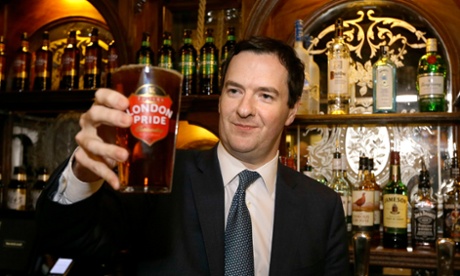
George Osborne is calling Wednesday’s wage growth figures a “major moment” in the UK’s economic recovery and it’s not hard to see why. With the general election less than five months away, the government is keen to generate a feelgood factor to close Labour’s small lead in the polls. There are a number of reasons why the chancellor has cause for some optimism.
The first piece of good news for ministers is that average earnings are now definitely rising. Pay excluding bonuses in the three months to October were 1.6% higher than in the same three months a year earlier. In October alone, it was 1.8% higher. This is still modest by the standards of yesteryear – earnings tended to grow by at least 4% a year before the financial crisis – but the trend is upwards.
The even better news is that wages are rising more quickly than prices, with the result that the longest squeeze on living standards since Victorian times is now over. What’s more, inflation is still falling, which means the pick-up in real earnings growth will accelerate between now and the election.
Plunging global oil prices mean that the annual inflation rate as measured by the consumer prices index is likely to fall as low as 0.5% in the first few months of 2015. Consumers will be spending less on heating their homes and running their cars, leaving more left over for discretionary spending. That’s the third plus for the chancellor.
A fourth is the now virtual certainty that the Bank of England will hold off from raising interest rates until after the election. Two members of the Bank’s monetary policy committee favour an increase in official borrowing costs from their record low of 0.5%, but none of the other seven members seemed inclined to join Martin Weale and Ian McCafferty in pressing for tighter policy. Mortgage rates are going to stay low.
The final reason for Osborne to feel cheery is that unemployment continues to fall, albeit at a slightly slower pace than it was earlier in the year. There are almost 600,000 more people in work than there were a year earlier, and there has been a 560,000 rise in the number of full-time jobs. With people more likely to lose their jobs and more likely to find one if they are currently workless, consumer confidence should strengthen.
There are, of course, reasons why the chancellor would be unwise to be counting electoral victory just yet. The current improvement comes very late in the parliament. Not everybody is benefitting from higher earnings, with official data showing that those on lower incomes tend to face higher inflation rates. It may take time for people to register that their living standards are rising, and even then they may not give the government any credit.
But history suggests that support for the government picks up in the last few months before an election. And the current state of the economy should reinforce that trend.

